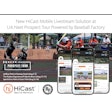Source: Little League®
In an effort to promote sportsmanship and increase the pace of play, Little League® has announced new rule and regulation changes to take effect in 2017.
SOUTH WILLIAMSPORT, Pa. (January 4, 2017) – This winter, the Little League® International Board of Directors has approved new rule and regulation changes that will take effect starting in the 2017 season. Along with two major administrative changes to background checks and residency requirements, the 2017 rule and regulation updates focus on increasing the pace of play across all divisions of Little League and continuing to help promote sportsmanship on and off the field.
Little League has also created a full breakdown of all of the rule and regulation changes, including clarification on each. This page, found at LittleLeague.org/Rules, will be updated frequently with any new rule and regulation changes.
In an effort to help increase the pace of play, Little League International has decided to incorporate the following new rule and regulation changes in 2017:
- Keep One Foot In Batter’s Box – Starting in 2017, local leagues will have the option to mandate batters keep one foot in the batter’s box throughout their at-bat, barring eight exceptions provided in the rule book, during regular season games. If the batter leaves the batter’s box or delays play and none of the exceptions apply, the umpire shall warn the batter. After one warning on a batter, the umpire shall call a strike. Any number of strikes can be called on each batter. During tournament play, the rule is no longer an option and all batters will be mandated to keep one foot in the batter’s box throughout their at-bat, barring the eight exceptions provided in the rule book.
- Intentional Walk [Baseball Only] – For Minor and Major Divisions of Baseball, defensive teams will now be able to elect to intentionally walk a batter by announcing the decision to the plate umpire. After appropriate notification is made by the defensive manager, the ball is ruled dead and no other runners may advance unless forced by the batter’s award of first base. Once the award is granted, four pitches will be added to the defensive pitcher’s official pitch count.
- Special Pinch Runner Rules – During tournament play starting in 2017, a team may utilize a player who is not in the batting order as a special pinch-runner for any offensive player twice a game, but not more than one time per inning. A player may only be removed for a special pinch-runner one time during a game. The player for whom the pinch-runner runs is not subject to removal from the lineup. If the pinch-runner remains in the game as a substitute defensive or offensive player, the player may not be used again as a pinch-runner while in the batting order. However, if removed for another substitute that player or any player not in the line-up, is again eligible to be used as a pinch-runner.
Along with the efforts for increased pace of play, additional rules and regulations were created to help promote sportsmanship within the Little League program:
- Stealing and Relaying of Pitch Selection and Location – Starting in 2017, local league umpires will have the option to adopt the rule that the stealing and relaying of signs to alert the batter of pitch selection and/or location is unsportsmanlike behavior. If, in the judgment of the umpire, this behavior is occurring, both the player and the manager may be ejected from the game. The same rule will be mandated during tournament play.
- Language Regarding On-Field Altercations – In an effort to assist umpires, language has been created in the 2017 rulebooks to provide umpires with guidance regarding fights and physical altercations. A manager, coach, or player shall not leave their position in the field or bench area during a fight or physical confrontation; a manager or coach who attempts to prevent a fight or restore order, in the umpire’s judgment, is not in violation of this rule. The umpire shall eject the offender(s) from the game immediately. Failure to comply with the ejection may result in the umpire suspending the game and referring it to the Board of Directors for further action.
Little League International Board of Directors also made the decision on the following rule changes in regards to the administrative roles of local leagues:
- Mandatory Criminal Background Checks – Starting in 2017, a local league within the United States must conduct a nationwide background check utilizing First Advantage or another provider that is comparable to First Advantage in accessing background check records for sex offender registry data and other criminal records. Each year, Little League International provides each local league located within the United States one hundred twenty-five (125) free criminal background checks administered through First Advantage. Local leagues located outside the United States must conduct a comprehensive criminal background check, including checks in the relevant country, as well as that country’s provinces/states and municipalities unless otherwise prohibited by the laws of the country of which the local league is located. No local league shall permit any person to participate in any manner whose background check reveals a conviction, guilty plea, no contest plea, or admission to any crime involving or against a minor or minors. All local leagues must take into consideration criminal records when making the determination whether the individual is unfit to participate in any manner in the league.
- Updated Residency Registration Process – As part of the new rule changes, Little League has modified the residency document requirements into three categories in order to prove “residence.” Beginning immediately, residence shall be established and supported by documents containing the full residence which includes parent(s) or guardian(s) name, street address, city, state and zip code information, dated or in force between February 1, 2016 (previous year) and February 1, 2017 (current year), from one or more documents from each of the three Groups outlined in the 2017 Rulebook. Also, a school report card or progress report may no longer be used as a School Enrollment Eligibility document. Players who established “residence” or “school attendance” for regular season and/or tournament prior to the 2016-2017 season using the Player Verification Form, and can produce the form with proper proofs and signatures, will be grandfathered and will NOT need to complete a new Player Verification Form.
These and other updates to the Little League Official Regulations, Playing Rules, and Policies can be found in the print and eBook versions of the Little League Rulebooks for the 2017 season. VisitLittleLeague.org/Rules for more information.
About Little League®
Founded in 1939, Little League® Baseball and Softball is the world’s largest organized youth sports program, with nearly 2.4 million players and one million adult volunteers in every U.S. state and more than 80 other countries. During its nearly 80 years of existence, Little League has seen more than 40 million honored graduates, including political leaders, professional athletes, award-winning artists, and a variety of other influential members of society. Each year, millions of people follow the hard work, dedication, and sportsmanship that Little Leaguers® display at our seven baseball and softball World Series events, the premier tournaments in youth sports. For more information, visitLittleLeague.org, and follow Little League on Facebook (facebook.com/LittleLeague), Twitter (twitter.com/LittleLeague), and Instagram (Instagram.com/LittleLeague).





























